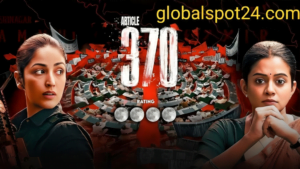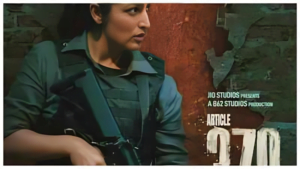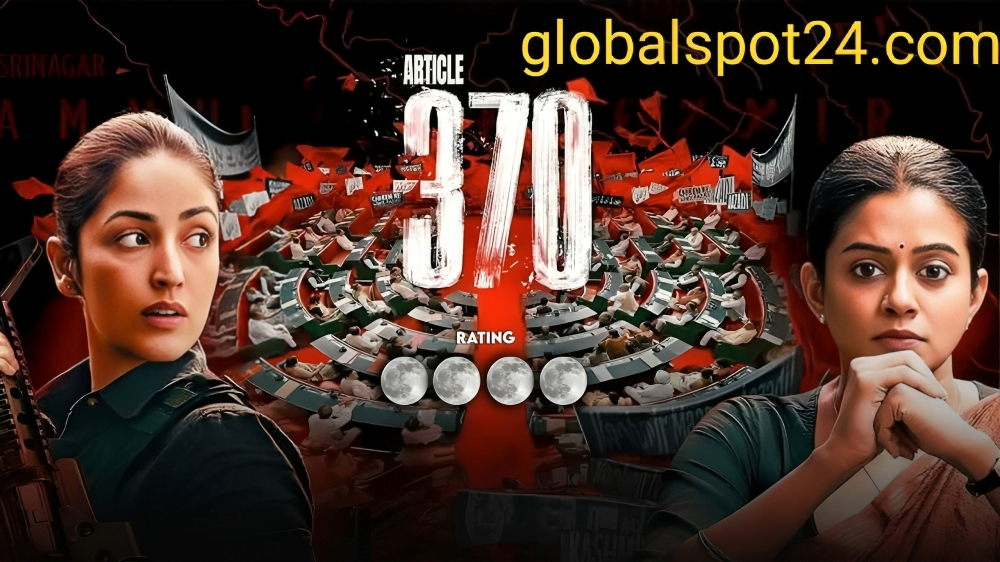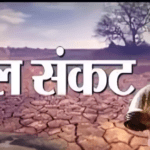Movie Review: “Article 370”
Blending reality with imagination, and occasionally straying into convenient inaccuracies, “Article 370” portrays the government’s decision to revoke the special status of Jammu and Kashmir as a strategic political maneuver. The film presents this historical event as a calculated display of statecraft prowess by the ruling regime.

The 2019 general elections had Uri: The Surgical Strike. Cometh the hour again, we have Article 370.
Aditya Dhar, who directed the first film and produced the second, has drawn a clear distinction between the two, labeling the former as a “war drama” and the latter as “political.” This clarification is significant, as “Article 370” delves into political themes, aligning itself with a particular ideological stance.
The film blends elements of fact with fiction, incorporating convenient untruths while echoing the right-wing narrative surrounding Jawaharlal Nehru’s perceived missteps in Kashmir and Maharaja Hari Singh’s supposed inclination towards India. Through this lens, “Article 370” presents the government’s decision to revoke the special status of Jammu and Kashmir as a strategic feat of statecraft, with the bending of constitutional obligations portrayed as a necessary sacrifice.
Standing on one side are dedicated soldiers, diligent intelligence agents, and industrious bureaucrats, accompanied by a Prime Minister (portrayed by Arun Govil, known for his role as Ram) bearing a striking resemblance to Narendra Modi. He intermittently provides sage-like insights reminiscent of a Great Leader figure. On the opposing side are depicted greedy and inept Kashmiri politicians, brainwashed militants, and alleged “paid” stone-pelters, receiving direction from Islamabad, which seemingly lacks a response to Delhi’s machinations.
ALSO READ | “Maagh – The Winter Within”: A standout Indian film of the year, offering a unique alternative amidst the plethora of animal-centric narratives out there.
As the narrative progresses to August 5, 2019, marking the abrogation of Article 370, the film sheds light on former J&K governor Jagmohan, portrays incidents like the tying of a person to the front of a jeep by an Army officer in a positive manner, and presents demonetisation as a means of cutting off the money trail of militants.

What enhances the viewing experience is the professionalism evident throughout “Article 370,” reminiscent of the quality seen in “Uri.” The film boasts impressive action sequences, dialogue devoid of melodrama, and efficient acting (with director Jambhale having garnered critical acclaim). Yami, playing an intelligence operative who is also a Kashmiri Pandit, adeptly carries both the emotional and professional weight of the film. Notably, “Article 370” commendably positions her alongside Priyamani, portraying an immaculately dressed senior bureaucrat in the PMO, at the center of the pivotal legislative moment.
“Article 370” concludes with a dramatic flourish, skillfully pacing the lead-up to the abrogation day as a race against time, unfolding simultaneously in Srinagar and Delhi. However, the film navigates through various events, including the encounter of Burhan Wani (who is notably identified by his real name), the Pulwama attack, the Balakot strike, and the portrayal of journalists, with one TV anchor in particular, depicted as self-serving careerists. Additionally, it scrutinizes the mocking of human rights, the mass arrests, and the prolonged security clampdown that ensued after August 5, 2019.
It’s worth noting that “Article 370” presents only one perspective on a complex issue that continues to evade simple answers.
The ordinary Kashmiri is personified in just one old man, who says he is tired of “begging” existing Valley leadership for favours and of seeing their children pushed into militancy. The film does not even venture into Jammu, forget Ladakh, crucial pieces to the puzzle.
In “Article 370,” J&K politicians bear the brunt of the portrayal, with a Mehbooba Mufti doppelgänger played by Seth and a Farooq Abdullah lookalike portrayed by Zutshi, who tends to overact. Even Ghulam Nabi Azad makes an appearance during the Rajya Sabha debate on the abrogation Bill as the Leader of the Opposition, albeit with a new identity that seems disconnected from his Muslim and J&K native roots, perhaps reflecting his amicable ties with the current government.
The Home Minister, depicted by a Amit Shah lookalike played by Karmarkar, initially seems to blend into the background, but he redeems himself with a pivotal moment when he presents the Bill in the House.
The film’s most nuanced character is Khawar Ali, portrayed by Arjun, the local Intelligence Department chief in Srinagar. He navigates covert operations with a mixture of concessions and favors, reminiscent of past practices. However, existing in shades of gray in a narrative that largely revolves around stark contrasts between good and bad doesn’t bode well for him.

Yami’s Zooni Haksar, whose father’s death is portrayed as the direct fallout of the J&K Bank scam (in which Abdullahs are facing a probe), gets to give a long, and passionately delivered, speech on how terrorism is all about money, Azaadi just a ruse, and Article 370 at the root of all evils from SCs not getting recognition, to Pandits having to leave the Valley, to women not getting their full rights.
And the house claps. And the government hears.
So, how is the josh? Clearly unflagging. Main Atal Hoon just went by, while up ahead (with two months to go for elections still) are films honing to the same script such as Accident or Conspiracy: Godhra, Bastar: The Naxal Story, Swatantrya Veer Savarkar…
Meanwhile, 370 now has a new flavour – no longer an Article in the Constitution, it’s the BJP’s seat target for 2024.
Article 370 movie director: Aditya Suhas Jambhale
Article 370 movie cast: Yami Gautam, Priyamani, Skand Sanjeev Thakur, Arun Govil, Raj Arjun, Sumit Kaul, Kiran Karmarkar, Raj Zutshi, Divya Seth
Article 370 movie rating: 2.5 stars









